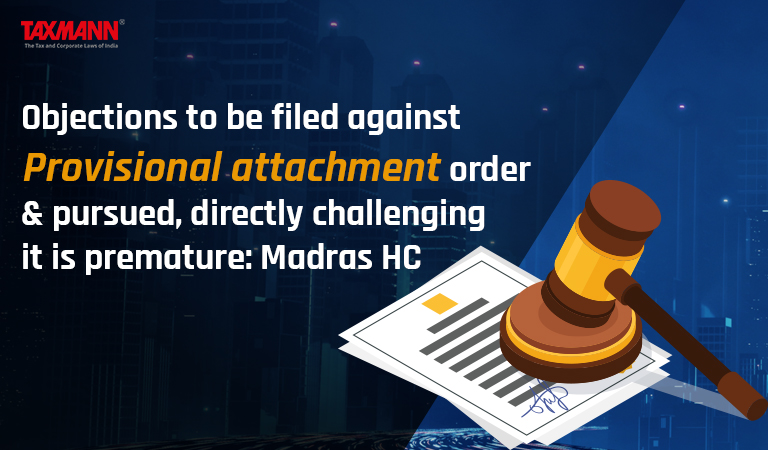Objections to be filed against Provisional attachment order & pursued, directly challenging it is premature: Madras HC
- Blog|News|GST & Customs|
- 2 Min Read
- By Taxmann
- |
- Last Updated on 4 September, 2021

Case details: Principal Additional Director General DGGI, Chennai v. Sri Marg Human Resources (P.) Ltd. - [2021] 130 taxmann.com 12 (Madras)
Judiciary and Counsel Details
-
- T. S. Sivagnanam and Sathi Kumar Sukumara Kurup, JJ.
- Rajnish Pathiyil for the Appellant.
- B. Kumar, Sr. Counsel and A. Ganesan for the Respondent.
Facts of the Case
An order was passed against assessee that it had fraudulently availed input tax credit on fictitious invoices to discharge GST liability. The department passed an order of provisional attachment of a bank account of assessee. It filed a writ petition against such provisional attachment on ground that there could not be any attachment of future receivables as it would strangulate entire business module of assessee.
The Writ Court observed that a sum of Rs 5.68 crores, which was lying in bank account of assessee was appropriated by department. The assessee had also agreed to pay another sum of Rs.1 crore against estimated tax due of about Rs.21 crores which would amount to discharge of 27.05% of estimated tax dues. Therefore, there was no meaning in attaching bank account of assessee and, accordingly, it was held that the attachment order was to be vacated.
The department filed an instant writ appeal against the order and submitted that the GST rules provide for a procedure that where person whose bank account was attached, could seek for lifting of such attachment by filing objections.
High Court held
The Honorable High Court observed that the assessee has already filed objections. Since, the assessee who had sought for lifting attachment by filing objection ought to have pursued the same. In this case, without pursuing said objections, a challenge to provisional attachment order would be premature. Therefore, the order issued in the writ petition was to be set aside.
Disclaimer: The content/information published on the website is only for general information of the user and shall not be construed as legal advice. While the Taxmann has exercised reasonable efforts to ensure the veracity of information/content published, Taxmann shall be under no liability in any manner whatsoever for incorrect information, if any.

Taxmann Publications has a dedicated in-house Research & Editorial Team. This team consists of a team of Chartered Accountants, Company Secretaries, and Lawyers. This team works under the guidance and supervision of editor-in-chief Mr Rakesh Bhargava.
The Research and Editorial Team is responsible for developing reliable and accurate content for the readers. The team follows the six-sigma approach to achieve the benchmark of zero error in its publications and research platforms. The team ensures that the following publication guidelines are thoroughly followed while developing the content:
- The statutory material is obtained only from the authorized and reliable sources
- All the latest developments in the judicial and legislative fields are covered
- Prepare the analytical write-ups on current, controversial, and important issues to help the readers to understand the concept and its implications
- Every content published by Taxmann is complete, accurate and lucid
- All evidence-based statements are supported with proper reference to Section, Circular No., Notification No. or citations
- The golden rules of grammar, style and consistency are thoroughly followed
- Font and size that’s easy to read and remain consistent across all imprint and digital publications are applied



 CA | CS | CMA
CA | CS | CMA
